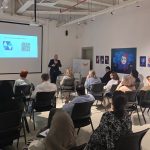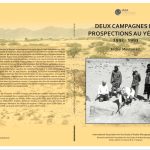A New Era of Virtual ‘Deference’
- admcef22
- January 30, 2023
April 30, 2020
To my colleagues and to the wider CEFAS community, I am writing to share my experiences related to the COVID-19 pandemic and to offer my support and encouragement. As we all face an undeniably unique and unprecedented time, we can be supportive of one another and be productive through modes of modern communication.
March 9th was a rainy and cloudy day. The inclement weather did nothing to distract from the beauty of Paris nor my intent to attend a conference and tend to some academic pursuits. I was in Paris for the Science Po meeting on Anthropology and War. I intended to visit the Louvre Museum during the break, but to my surprise, I saw a long line of visitors waiting to enter the museum. I was told that the museum staff was refusing to receive people due to the COVID-19 crisis- which WHO would declare on March 11th to be a pandemic. I did not see anyone wearing mask-and-glove, including people waiting in the line, nor in Paris during my walk to shops in or around the conference. I was not certain if this crisis was a global or a regional problem. Besides the incident at the Louvre, I had not seen any behavior, during my stay, by the Parisians or the tourists that would indicate a public health concern.
Okay. there are two more things I had to do during my visit to Paris. First, I had to submit my thin-section slides to an academic lab for a mineralogical study. The 4000-year-old ceramic potsherds were from Arabian Gulf archaeological sites- naturally important to me and the whole world. Also, I had to go to a studio to convert 70-year-old reels to an HD version along with 300 slides of the first excavation carried in Kuwait. Converting print media over to digital formats to preserve historical databases are tedious, but a necessary chore.
Yes, the Kuwaiti government had suspended the schools March 15th and forced Kuwaitis to enter ‘an institutional quarantine’. Passengers on flights coming from Italy, Iran, Iraq, China, Hong Kong, and South Korea were going to be screened and quarantined. On that day of March 9th, the total number of infected people in Kuwait was 58 and you had to turn the newspaper to page 11 to find any news related to Coronavirus ! When my return flight landed in Kuwait, I entered the COVID-19 mitigation response headlong. There were less than 40 passengers in the entire airport ! All shops were closed, and we were being forced to follow a queue to get tested ! The next day, I received a call to visit Jaber Hospital and get swabbed, “one of your colleagues got infected, you must have a 14-day home quarantine”, Doctor ‘S’ told me.
The instructions included staying in an isolated room ; use disposal plates, cups, a box of gloves, and masks, bottles of water ; and no touching- physical distancing. I was worried and cautious. In my last day of quarantine, I had to test again – a negative result. I thought, “I’m happy now, not scared, but more cautious”. Then the government announced that Kuwait will be locked down for two weeks !
I came to realize that this COVID-19 crisis was bringing about a major change to our lives as the ‘social distancing’ recommendations (I rather prefer physical distancing) took hold. Though I was unable to interact with everyone I was accustomed to seeing, I thought I can still go to my laboratory and the museum at Kuwait University. Perhaps, I can retrieve my materials, some books, and make sure the place is locked. “Hasan, the campus is shut down…No access to any office or any facilities”, Mohammad, the campus guard, said. With the increase in the number of new infections and the first recorded fatality, the government was promoting strict social distancing and adopted more lockdown measures to keep the population safe.
The safety of our people and the world are paramount. Even though the lockdown measures and the health crisis would be painful to the economy, our lives are at stake. There can be no compromise ! So, let’s try to get work done at home, right ? Unfortunately, debates are still ongoing regarding the E-learning platform at Kuwait University. If it is allowed through legislative action, then there is the technical installation all of which appears to be postponed until August ! Labs and facilities are locked ! Even the materials I submitted for analyses in Paris were on hold and not processed. The people there (at least those whom I have worked with) were staying at home and completely applying home and self-quarantine after the dramatic increase of COVID-19 in Paris.
What will be the challenges academics face during this pandemic ? Personally, so many questions and thoughts came to my mind regarding how to tackle the logistics of my research. Do we expect to have, let’s say by two month, a portable ICP-MS instrument to analyze our archaeological samples instead of exporting our sample to other labs ? Is it possible to have a device attached to my laptop reading the mineralogical inclusions of ceramic samples instead of sending the slides to Paris ? Can I expect a lab staff in Texas to have this remote-reading for my samples, while I’m in Kuwait ? I can imagine a laser-ablation device attached to my computer screen and obtain the chemical component results while talking to David who is running the test ! Now, would be the time to outfit a remote-lab to have human remains analyzed, instead of grappling with the US homeland security over importing sensitive remnants into the country ! I would not say it is impossible even though it took 81 years to modify a large X-Ray fluorescence machine to a fully handheld XRF ! Imagine the accurate and efficacious portable XRF, the first SDD detector, used by colleagues in academia was in 2008 ! No more destruction, solution sample, and other limitations, just hold a machine 30 cm in length and get the result with seconds ! Collaborative research will change in nature and character.
This change will continue, for as long as, the coronavirus pandemic impacts our lives. My family members told me that they never thought that, under any condition or crisis, going to the grocery store in Kuwait must be through online registration and appointment ! Yes, you are allowed only one visit per week for 30 min maximum to shop at the supermarket !
I know that the framework for teleworking must be coming soon, but my anxiety lies in how to manage my professional responsibilities in a domestic setting. Also, how does one fulfill administrative duties, a research agenda, and maintain familial ties in the same room ? Or is it an office ? Maybe I will call it my library ? It is a strange new world to have online “Dewanyia” or “a night gathering”. Even more disconcerting is to refuse holding a traditional funeral. Can you invite your relatives and friends for Ramadan Iftar ? At this point, I have no idea how our society will look after this ‘war’, that may continue for months or another year. How can I go to a class and define “culture” and “social interaction” for students using Dewaniya as an example ? Dewanyia was defined as a gathering in which there are discernable social roles within a hierarchy. The good news is the fluidity of Kuwaiti culture is such that Dewaniya is being practiced as a virtual gathering. The interesting part is how will we express deference to those amongst us on a virtual platform.
Voir en ligne : Pour plus de billets sur le COVID-19 dans la péninsule Arabique






